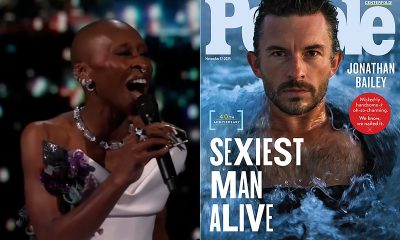Arts & Entertainment
Album roundup: Gaga just so-so on new album ‘Chromatica’
Indigo Girls shine, Adam nails it and Perfume Genius — wtf?
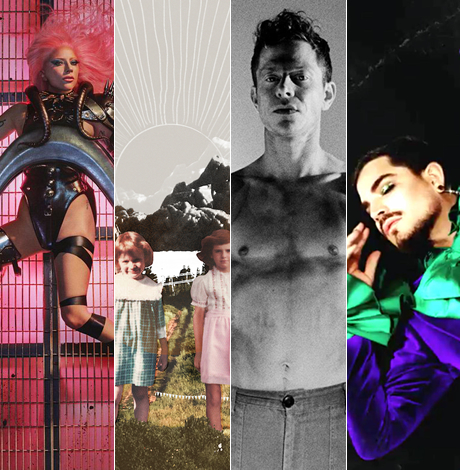
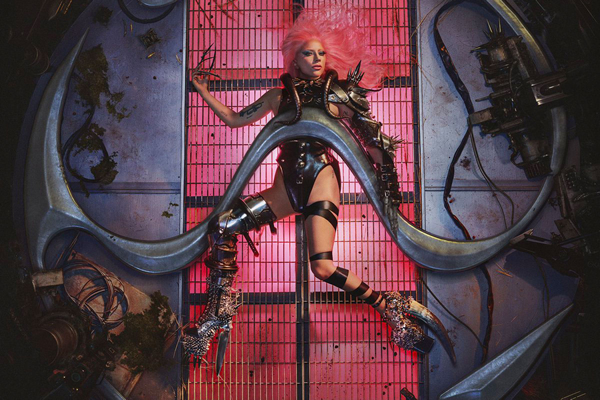
Lady Gaga
Chromatica (**1/2 out of four)
Streamline/Interscope
Although Lady Gaga has never had an out-and-out bomb, she lost her footing a bit with her 2013 album “Artpop.”
Her fans point to its decent chart performance (it debuted at no. 1 and went platinum) and say that’s more perception than reality, but she was starting to experience a law of diminishing returns. The danceclub hits and outrageous fashion upon which she built her brand didn’t resonate the same way five years into her career.
She wisely recognized that and veered hard left making an album with Tony Bennett (of all people; 2014’s “Cheek to Cheek”), recapturing the pop culture zeitgeist with movie debut “A Star is Born” (pleasantly, she actually can act) and go mellow and subdued with her last studio album, 2016’s more singer/songwriter-oriented “Joanne.”
“Chromatica” (out May 29) is her official return to form. It all goes down breezily enough — it’s an easy, catchy listen — yet it’s also not quite the reclaiming of the pop diva throne she clearly intended it to be. It’s good, not great; her fans will love it and it will make a respectable chart dent but creatively she’s painted herself into a corner. While some of her unexpected (at the time) career swerves served her well and were well received, you can’t build a whole career on stunt casting — the meat dress! the Tony Bennett duets! “American Horror Story”! a “normal” album from kooky Gaga! Stuff like that only gets you so far then you’re kinda back where you were five years prior (albeit with an Oscar in tow).
Eventually you have to return to the business of doing what it is you supposedly do and a decade in to her admittedly impressive career, it feels like she’s reaching the bottom of her bag of creative tricks. “Chromatica” suggests to me we’ll look back on her in 50 years more as a Petula Clark (the singer of a decent string of era-defining standards)-type figure rather than a Bette Midler or, heck, even a Kelly Clarkson.
Gaga takes the “Confessions on a Dancefloor” approach here — there’s not a ballad in the batch. Track after track — first single “Stupid Love,” “Plastic Doll,” “Replay” and dozens more — are full of big, luscious, vaguely ’80s-tinged club beats courtesy of producer BloodPop (Justin Bieber, Britney Spears, et. al.), and melodies that take advantage of her impressive set of lungs. The lady can sing — nobody is arguing otherwise.
But it all gets a little samey sounding by the album’s end and a trio of orchestral interludes (dubbed “Chromatica,” “Chromatica II” and “Chromatica III”) sound like they were yanked off some poor man’s Ralph Vaughan Williams imitation attempt and tacked on for contrast and gravitas. They backfire though, sounding like ludicrous non sequiturs.
Lyrically there’s nothing terribly interesting happening but the guest spots — Ariana Grande on second single “Rain on Me,” K-pop girl group Blackpink on “Sour Candy” and Elton John on “Sine From Above” — work slightly better than you’d think. She doubles John’s vocal an octave above to pleasant effect. Glammy, campy (but fun!) final song “Babylon” had me picturing the “Queer as Folk” cast on the dancefloor.
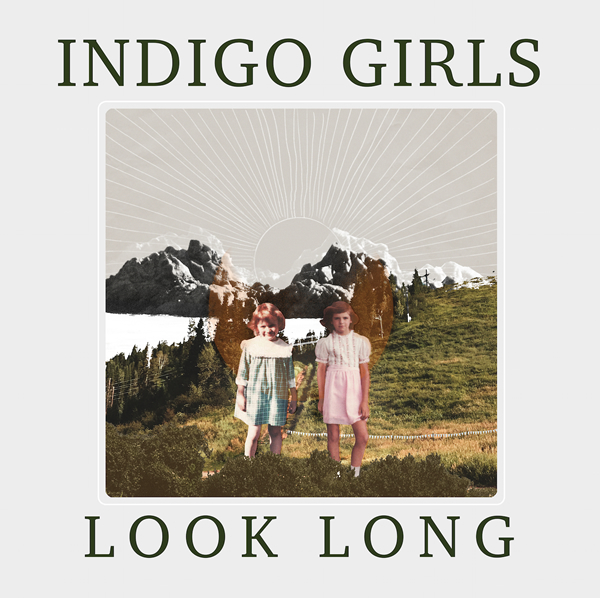
Indigo Girls
Look Long (***1/2)
Rounder Records
It’s easy to take the Indigo Girls for granted. Although it’s been five years since their last studio album (2015’s “One Lost Day”), they keep busy with constant (pre-COVID-19) touring, regular solo outings from both members (Emily Saliers and Amy Ray, both lesbians) and even a live symphony album “Indigo Girls Live with the University of Colorado Symphony Orchestra” (2018).
Their new album “Long Look,” (May 22) however, is a pleasant reminder that not only are they greater vocally than the sum of their parts — their harmonies are truly heavenly — their songwriting is so assured and mature, they’re doing some of their best work now ages after aging (sadly) out of commercial relevance. John Reynolds, who also produced their 1999 album “Come On Now Social,” is back at the reins.
Standout cuts are the groovey, swampy opener “Shit Kickin,’” dance-around-the-campfire-esque “Howl at the Moon,” the plaintive title cut (in which they sound vocally as lovely as Emmylou Harris) and sonic curveball “Favorite Flavor.” Musically overall, this is Americana.
Topics are lyrically varied. “Feel This Way Again” is an urge to teens to savor emotions, album closer “Sorrow and Joy” is a well-crafted examination of ‘80s-era politics and it varies outward from there. Only occasionally (the chorus of “Flavor” or the slightly cloying “Country Radio”) do things feel a tad forced.
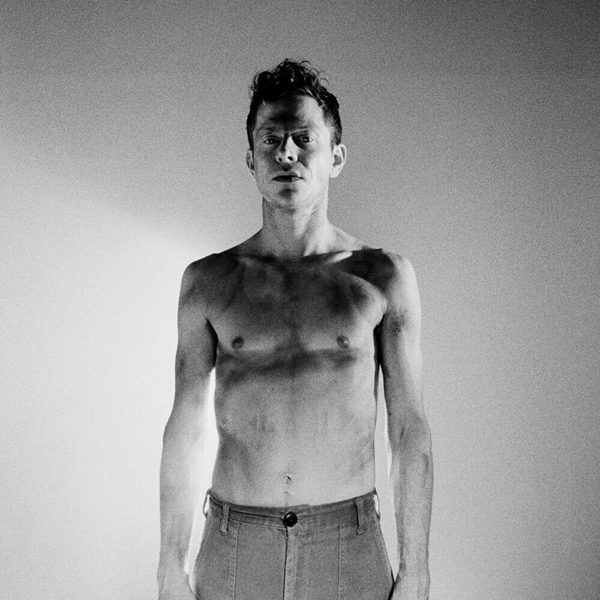
Perfume Genius
Set My Heart on Fire Immediately (*1/2)
Matador
Perfume Genius (aka Michael Hadreas) is back with his fifth album (it dropped mid-May) and while it’s more accessible (which isn’t saying much) than his previous efforts — some tracks actually feel like songs — it’s still a tough listen and something you have to be in the mood for.
Atmospherically, there’s a lot here to appreciate — the dreamy, ethereal “Whole Life,” the gauzy, fuzzy rock guitars on “Describe,” the retro organ underpinnings of “One More Try” and so on. One senses here that no instrumental choice or sonic effect was chosen haphazardly; Hadreas (38 and gay) and producer Blake Mills (who returns after 2017’s “No Shape”) took obvious care and mood and texture, to them, is everything (it certainly trumps melody and tempo).
The degree to which you like this album will be proportional to how much avant garde you can stomach. I tried to just close my eyes and savor it on its own terms but I also couldn’t wait for it to be over. The too-precious-by-half, whispery falsetto vocals on “Jason,” the plodding, uncategorizable “Your Body Changes Everything” and the sonic whiplash of “Some Dream,” which sounds like silly nonsense, had me itching to go put on some Jonas Brothers.
In fairness, though, could this be one of those magical albums that just needs time to seep into your pores? An album you endure on the first listen but can’t get enough of three months later? It’s a fair question, but I’m going with no. Texture solely for the sake of texture — and that’s what this feels like — just isn’t enough for me.
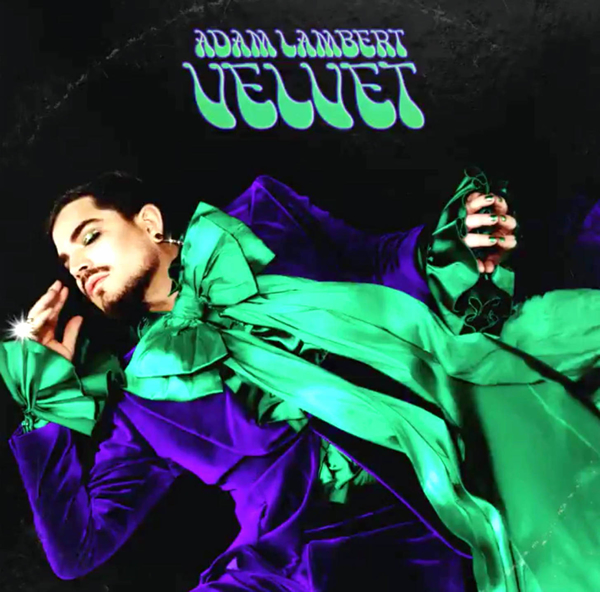
Adam Lambert
Velvet (***1/2)
Empire Distribution
An album you might have missed (somehow I did) that dropped in late March is the new Adam Lambert project “Velvet,” the gay “American Idol” runner-up’s fourth.
Lambert here manages to hit that sonic sweet spot where the production sounds both retro yet uber contemporary. There’s a funky, groovy, ’70s/Stax vibe here but also a 2020-kind of top coat on everything that sounds utterly of the moment.
Stylistically it’s still varied. “Superpower” is slutty and all attitude, “Loverboy” is a neo-disco shuffle, “Comin’ in Hot” is slinky and skanky and “Love Don’t” is a gritty rocker. “Ready to Run” has rock swagger and gospel organ accents. First single “Roses,” a duet with Nile Rodgers (of Chic) has lovely hooks and atmosphere to spare. It’s a romantic kiss-off to a lover who offers gestures but little else.
There are only a handful of slow songs, a straightforward piano ballad (“Closer to You”) and closer “Feel Something,” the album’s only pensive, moody moment.
Only occasionally and fleetingly does Lambert fumble — a weak chorus on “New Eyes,” a couple spots where the hooks aren’t quite enough to undergird the swagger and energy, but even then, Lambert’s shimmering whale of a voice — his calling card — is enough to sustain pleasure throughout. This is my summer car album for sure.
Photos
PHOTOS: Sydney Gay and Lesbian Mardi Gras Parade
48th annual LGBTQ event held in Australian city

The 48th annual Sydney Gay and Lesbian Mardi Gras Parade was held on Feb. 28.
(Photos by Cori Mitchell)




















a&e features
35 years after ‘Truth or Dare,’ Slam is still dancing
Salim Gauwloos on Madonna, HIV, and why he almost didn’t audition for Blond Ambition Tour

Most gay men of a certain age remember “the kiss.”
It was the moment Madonna’s dancers Salim Gauwloos and Gabriel Trupin locked lips in the hit 1991 documentary film “Truth or Dare,” which is celebrating its 35th anniversary this spring.
The kiss was hot, but what made it groundbreaking is that it appeared in a mainstream Hollywood movie that screened in suburban multiplexes across the country. This wasn’t an obscure art house film. The movie, and tour on which it was based, received months of breathless media attention all over the world for bold expressions of female empowerment and queer visibility. Madonna was threatened with arrest in Toronto for simulating masturbation on stage and Pope John Paul II urged Catholics to boycott the show, triggering a media firestorm.
“Truth or Dare” was billed as a behind-the-scenes documentary of the tour, but it quickly became clear that the real star of the show wasn’t Madonna, but rather her colorful troupe of seven backup dancers, six of whom identified as gay: Kevin Stea, Carlton Wilborn, Luis Xtravaganza Camacho, Jose Gutierez Xtravaganza, Gauwloos, and Trupin; Oliver Crumes III identifies as straight.
We saw them party and march in the New York City Pride parade. They were unabashedly queer at a dangerous time — before protease inhibitors began to stem the AIDS plague and before most celebrities and politicians embraced the gay community in any real way. Being out in 1991 carried major risks to career and reputation.
Enter Gauwloos, one of those brave dancers who vogued his way into the hearts of countless gay men entranced by his handsome looks, his stage presence, and dance skills.
Gauwloos — known then and now as “Slam”— sat down with the Blade to talk Madonna, the lasting impact of “Truth or Dare,” the public disclosure of his HIV status, and plans for a new book on his life.
His story is fascinating — from growing up in Europe to dancing in New York to landing the gig of a lifetime with Madonna. He performed on that tour while secretly HIV positive and went without medical treatment for 10 years because he was living in the United States as an undocumented immigrant. Not even Madonna knew of his HIV status. Two other dancers on the tour were also HIV positive but no one talked about it. Ironically, Madonna was singing “Express Yourself” and advocating for condom use during her concerts yet backstage three of her dancers were secretly positive.
“A lot of people were dying so I wasn’t going to tell Madonna I had HIV,” said Slam, now 57. “And the others didn’t either. It wasn’t the moment to do it. She used to make speeches about Keith Haring and AIDS and I thought it’s going to be me next.”
Gabriel Trupin died of AIDS in 1995. Slam was diagnosed at age 18 in 1987, a frightening time when a positive test result often meant a death sentence. He booked the “Blond Ambition Tour” at age 21 after moving to New York. His friends encouraged him to audition but Slam resisted because he wasn’t a big Madonna fan.
“It was crazy, everyone wanted that job,” he said, “but I wanted to dance with Janet Jackson and Paula Abdul.” He listened to his friends and shortly after the audition, Slam received a call from Madonna herself inviting him to join the tour.
“We all wanted to be stars but not even Madonna knew how big that tour would become. The way it was choreographed and directed, the stars aligned. … It never looks dated even today.”

The world tour kicked off in Japan in April 1990 then moved to the United States and Europe, stirring controversy wherever it went. There was the iconic cone bra; the aforementioned simulated masturbation during “Like a Virgin”; and religious imagery that offended many Catholic groups and the Vatican.
And the controversy didn’t end with the tour. Cameras were rolling throughout the tour for what Slam thought would be a “video memory” for Madonna. But as the tour unfolded, director Alek Keshishian reportedly became more interested in what was happening behind the scenes so plans for mere tour footage were expanded into a full documentary.
“We were young and partying and didn’t really know what was going on,” Slam said. “You live in this celebrity bubble and you sign a paper – I don’t even know what I signed.”
In 1992, Kevin, Oliver, and Gabriel sued Madonna for invasion of privacy and fraud claiming she used some footage without their consent. They claim they were told nothing would be included in the film that they didn’t want to be seen. In one specific incident, Gabriel alleged that he told producers he didn’t want the scene of him kissing Slam to be in the film as he wasn’t fully out.
“Gabriel was forcibly outed,” in the movie, Kevin said in a 2016 interview.
Slam did not join his colleagues in the lawsuit.
“I couldn’t sue because I was illegal but I wasn’t ever going to sue,” Slam said. “I’m not a suing kind of person. But good for them, they fought for it and won. A lot of people don’t have the balls to sue Madonna.” The suit was settled two years later for an undisclosed sum.
“We were all conflicted about the kiss,” he said with a laugh. “The kiss, oh my God, my boyfriend is going to kill me! Belgian stress!”
Beyond worrying about his boyfriend’s reaction, Slam had concerns about the impact of being openly gay on his modeling career.
“In 1990, you couldn’t get high fashion campaigns as an openly gay model,” he said. “I was worried about that. I couldn’t get a campaign because I was gay. My agency told me to say I was straight and it was just a game.”
In 2016, pegged to the 25th anniversary of “Truth or Dare,” the surviving six dancers filmed a documentary about their lives post-Madonna titled “Strike A Pose.” In it, Slam publicly revealed his HIV status for the first time in an emotional scene with his former colleagues.
“I found the strength to tell the world I have HIV,” he recalls. “I was scared but I felt brave. The outcome and messages were beautiful. After I saw ‘Strike A Pose,’ I knew we gave people hope. And not just for gay people.”
He was infected in 1987 but didn’t get treated until 1997. After the tour ended, he said he went into a depression and his agency dropped him.
“I was partying too much after the tour,” he recalls. “I made a decision to live as an illegal alien.” In 1997, Slam collapsed and was rushed to the hospital with pneumonia.
“They started treating me and thank God the new HIV drugs were out, the cocktails, it took me a couple months to get better.”
Madonna didn’t participate in “Strike A Pose” and Slam said he hasn’t seen or spoken to her since the end of the tour. He said he had no idea of the impact “Truth or Dare” would have.
“You look at this movie in 1991 and you don’t think it’s going to be such a big thing and 35 years later it’s still helping people,” he said. “It was helpful for people who felt alone at that time. It was such an important documentary.
“I don’t think younger gay people realize how important Madonna was to gay and queer visibility — she was a big part of it. We showed the world it’s OK to be gay and that was the great message of this movie.”
He noted that, decades later, many of his friends have transgender kids and that queer culture is represented in much of mainstream pop culture.
“It’s amazing how far we’ve come,” he said. “I know we’ll always be marginalized but we have come so far. I’m really proud of our community. The current nightmare will be over and I do believe that things will get better.”
Referencing President Trump’s attacks on the LGBTQ community and crackdown on immigration, Slam described the situation in the U.S. today as “sad.”
“Everything is such a mess,” he said. “Some of these people have lived here 30-40 years and they take you out of your home. I can’t even imagine. It breaks my heart. When I was illegal it was a different story.”
Slam met his husband, Facundo Gabba, who’s from Argentina, in 2000, and he helped him get a legal case together to win citizenship. He filed a case in 2001 and was told there was a 99 percent chance he wouldn’t be permitted to stay in the United States because they weren’t allowing HIV-positive immigrants to remain in the country. But he got his green card anyway in 2005 and became a U.S. citizen in 2012.
Today, Slam and Gabba live in Brooklyn, though they travel a lot because “I can’t take the cold.” The couple married in Argentina in 2010 and in the U.S. in 2016.
Slam is still dancing and working as a choreographer. He’s teaching at a contemporary dance festival in Vienna in July and even offers online lessons via Salimdans.com.
As a longtime HIV survivor, Slam is dedicated to a healthful lifestyle.
“You have to keep moving; when you move you stay healthy,” he says. “Dance heals everything. I do yoga, I eat healthy and clean as possible. I don’t watch much TV … I try to stay healthy and positive. If I absorb all of the negativity I would be sick.”

In addition to his ongoing work in dance and choreography, Slam is in the early stages of writing a book about his extraordinary life and pioneering career.
“I always knew I had a book inside of me. I want to talk about my HIV status. I know I can inspire more people. I want to tell even more secrets in the book; secrets are a poison so I want to tell everything.”
Among those secrets, he notes, is a desire to write about his strict Muslim father and the years he spent as an undocumented immigrant in America.
“Those are the things I want to talk about, the struggles. It’s a love story, hope and resilience. I know it will help people.”
As for his friends from the tour, Slam says he remains in contact with Gabriel’s mother and José Xtravaganza is his best friend. Baltimore’s Center Stage theater is currently developing a new musical about Xtravaganza’s life. And Slam said he occasionally talks to Oliver, though “he still can’t pronounce Sandra Bernhard’s name.”
At the end of our interview, Slam indulged a round a rapid fire questions:
• Favorite song to perform in the “Blond Ambition” tour? “Express Yourself.”
• Aside from Madonna, who was your favorite artist you worked with? Toni Braxton in “Aida” on Broadway.
• Favorite Madonna song? “Live to Tell”
• Favorite Madonna video? “Bedtime Stories”
• What’s more stressful: performing in a concert or performing on the VMAs? “Both, because we always had to be perfect.”
• Did you go to Madonna’s recent “Celebration” tour? “I didn’t see the show but I saw clips online.”
• What do you remember most about performing “Vogue” at the VMAs? “It was nerve-racking for them to flip those fans.”
• When was the last time you vogued? “I teach classes so a couple weeks ago.”
Books
Love or fear flying you’ll devour ‘Why Fly’
New book chronicles a lifetime obsession with aircraft

‘Why Fly’
By Caroline Paul
c. 2026, Bloomsbury
$27.99/256 pages
Tray table folded up.
Check. Your seat is in the upright position, the airflow above your head is just the way you like it, and you’re ready to go. The flight crew is making final preparations. The lights are off and the plane is backing up. All you need now is “Why Fly” by Caroline Paul, and buckle up.

When she was very young, Paul was “obsessed” with tales of adventure, devouring accounts written by men of their derring-do. The only female adventure-seeker she knew about then was Amelia Earhart; later, she learned of other adventuresome women, including aviatrix Bessie Coleman, and Paul was transfixed.
Time passed; Paul grew up to create a life of adventure all her own.
Then, the year her marriage started to fracture, she switched her obsession from general exploits to flight.
Specifically, Paul loves experimental aircraft, some of which, like her “trike,” can be made from a kit at home. Others, like Woodstock, her beloved yellow gyrocopter, are major purchases that operate under different FAA rules. All flying has rules, she says, even if it seems like it should be as freewheeling as the birds it mimics.
She loves the pre-flight checklist, which is pure anticipation as well as a series of safety measures; if only a relationship had the same ritual. Paul loves her hangar, as a place of comfort and for flight in all senses of the word. She enjoys thinking about historic tales of flying, going back before the Wright Brothers, and including a man who went aloft on a lawn chair via helium-filled weather balloons.
The mere idea that she can fly any time is like a gift to Paul.
She knows a lot of people are terrified of flying, but it’s near totally safe: generally, there’s a one in almost 14 million chance of perishing in a commercial airline disaster – although, to Paul’s embarrassment and her dismay, it’s possible that both the smallest planes and the grandest loves might crash.
If you’re a fan of flying, you know what to do here. If you fear it, pry your fingernails off the armrests, take a deep breath, and head to the shelves. “Why Fly” might help you change your mind.
It’s not just that author Caroline Paul enjoys being airborne, and she tells you. It’s not that she’s honest in her explanations of being in love and being aloft. It’s the meditative aura you’ll get as you’re reading this book that makes it so appealing, despite the sometimes technical information that may flummox you between the Zen-ness. It’s not overwhelming; it mixes well with the history Paul includes, biographies, the science, heartbreak, and exciting tales of adventure and risk, but it’s there. Readers and romantics who love the outdoors, can’t resist a good mountain, and crave activity won’t mind it, though, not at all.
If you own a plane – or want to – you’ll want this book, too. It’s a great waiting-at-the-airport tale, or a tuck-in-your-suitcase-for-later read. Find “Why Fly” and you’ll see that it’s an upright kind of book.
The Blade may receive commissions from qualifying purchases made via this post.



